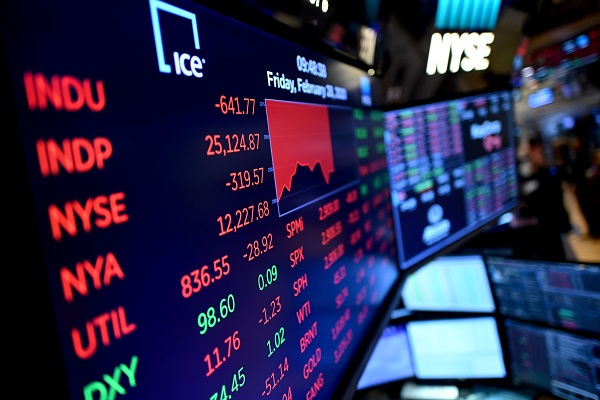Market snapshot: UK shares bucking global jitters
While overseas investors fret about developments on bond markets, there's better news for UK stocks. ii's head of markets assesses latest developments at home and abroad.
23rd May 2025 08:31
by Richard Hunter from interactive investor

Investor relief in the main equity indexes following the temporary tariff truce has now morphed into distress in the bond market, where ballooning deficits have become a central concern.
The sell-off in bonds pushes prices lower and therefore yields rise, which has implications for borrowing in general. Indeed, payments on debt can therefore increase significantly, which would add to the burden on an already bloated US budget deficit. Having passed the House, a bill which includes lower taxes and higher military spending will now go to the Senate which, if agreed, could add an estimated $4 trillion to government debt at a time when inflationary concerns are already in evidence in the bond space.
- Invest with ii: What is a Managed ISA? | Open a Managed ISA | Transfer an ISA
While there would likely be a boost to the economy in the shorter term, with lower taxes likely to feed into increased consumer spending alongside the stimulative effects of additional defence investment, it is the longer-term debt hangover which is beginning to test patience. Indeed, there are some worries that investor insouciance is also coming into play.
Earlier in the week, there were bond auctions in both the US and Japan, both of which revealed a lack of demand with investors clearly requiring a higher payback to fund multi-decade borrowing for these governments. In addition, recent downgrades to the US credit rating have renewed a “Sell America” narrative which is growing louder.
This has also prompted a renewal of haven investments, with gold resuming its ascent to propel it 26% so far this year. Even a better-than-expected manufacturing report in the US met with a frosty reception on the basis that many businesses had simply brought forward orders in attempt to avoid the incoming – and potentially hefty - tariff impacts.
Equity markets have also been affected by the bond skirmish, and the main indices find themselves in negative territory once more. In the year to date, the Dow Jones is down by 1.6%, the S&P500 by 0.7% and the Nasdaq by 2%, despite some speculative buying over recent days in mega cap technology growth stocks.
- ii view: BT ramps up spending on fibre rollout
- Scottish Mortgage outperforms for first time in four years
Asian markets were mixed overnight, unsurprisingly unable to throw off the shackles of the huge challenges to come in economic growth and stability amid the tariff trauma.
In Japan, there was an increase in core inflation to 3.5%, the highest level in over two years, which would normally suggest that the Bank of Japan stands ready to increase interest rates. However, the recent signs of economic weakness, let alone what may yet be to come, could mean that their power to react becomes more limited.
The UK continued to confound the economic naysayers with retail sales data which revealed 1.2% growth in April, significantly higher than the expected 0.2% improvement. The consumer is clearly still on the march, although there could be an element of spending ahead of the tax impacts which are yet to fully wash through. An unwanted side effect of the reading could also be that the Bank of England will be even less likely to reduce interest rates at a time when economic growth is struggling.
Even so, the surprising resilience of the domestic economy alongside some renewed interest in UK markets generally leaves the FTSE250 up by 1.1% so far this year. The premier index also bucked the global jitters at the open, with a positive trend emerging among, but not limited to, the likes of the airlines and Rolls-Royce Holdings (LSE:RR.) following some positive anticipation leading into the peak holiday season.
- Where next for tech shares following the tariff turmoil?
- Sign up to our free newsletter for investment ideas, latest news and award-winning analysis
There was a slight headwind from Games Workshop Group (LSE:GAW), which fell by more than 3% despite a positive trading update which estimated higher revenue and profit for the year on the back of an increase in licencing sales. Even so, the stock may have fallen foul of some profit-taking after a rise of 61% over the last year, which resulted in its promotion from the FTSE250.
The FTSE100 continues to build on its reputation as an increasingly desirable investment destination, and the rise so far this year of 7.4% - let alone the additional attraction of an average 3.4% dividend yield – leaves the index just over 1% shy of the record high which it recorded in March.
These articles are provided for information purposes only. Occasionally, an opinion about whether to buy or sell a specific investment may be provided by third parties. The content is not intended to be a personal recommendation to buy or sell any financial instrument or product, or to adopt any investment strategy as it is not provided based on an assessment of your investing knowledge and experience, your financial situation or your investment objectives. The value of your investments, and the income derived from them, may go down as well as up. You may not get back all the money that you invest. The investments referred to in this article may not be suitable for all investors, and if in doubt, an investor should seek advice from a qualified investment adviser.
Full performance can be found on the company or index summary page on the interactive investor website. Simply click on the company's or index name highlighted in the article.